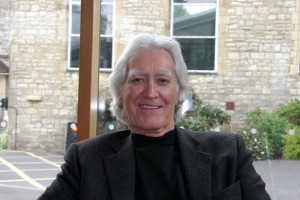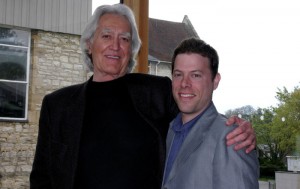Larry Dossey, MD, interviewed by Gil Dekel, PhD (part 2 of 2)
Gil Dekel: What is the experience of premonition?
Larry Dossey: When people access information from the future, it can manifest and be experienced in different ways. People have a sense of information through a dream; this can occur also in the waking state in which case we might call it intuition or just a gut feeling or vibes. Some people have premonitions associated with bodily symptoms. They have certain feelings in certain areas of the body every time they get a valid premonition. A friend of mine who is a physician has a feeling of chest pain every time one of his patients is going to deliver a baby. This never fails. So his premonition of the delivery of the child is hooked up with a bodily sensation. There are many cases where people experience not just ‘knowing’ but a feeling or sensation in the body.
In my book on premonitions I talk about the international investor George Soros whose son, in an interview, said that when it was time for his father to make a move in one of the markets, the father had horrible back pain. So his back pain is a cue about what’s going to happen, a premonition about a movement in the market. The back pain is his red light to whether make an investment decision positively or a negatively.
The way people gain information is extremely varied. Just recently I had an email from a highly successful investor in Amsterdam who in confidence told me that he gets his information about how to invest through dreams. His deceased father comes to him in a dream and gives him advice. And he bases his very successful performance in the market on his father’s advice in dreams. Now this may sound crazy; but if someone who is hugely successful in business reveals that this is his method, then it’s kind of difficult to argue against.
Business and spiritualism…
In my book on premonitions I talk about several controlled experiments using psychics, to make decisions in the silver futures market on Wall Street; about when to invest or not invest. One of these experiments was so successful and was written up on the front page of the Wall Street Journal. And interestingly, in several of these experiments, they’re successful as long as people keep greed in check. But what often happens, one of these studies will be successful, and then the greed will overcome the experimentalist who will try to break the bank on the next one; try to get completely rich. When they do that and greed penetrates the experiment, it simply doesn’t work anymore. There does seem to be a limiting principle here of greed. I find that fascinating.

‘The way people gain information is extremely varied.’ (artwork: ‘Staircase To The Self’ by Gil Dekel)
Some people may argue against premonition, saying that the feeling of premonition – the sense of knowing of event to come – may actually alter the future, and cause the event to happen.
That’s an interesting question. If we’re setting up the future and controlling the future, then perhaps premonition is not valid. I think that’s theoretically possible, certainly if we envision a future and we work hard to make it come about; certainly our intentions matter. We can engineer the future to a certain extent.
I’m open to that idea but there are many cases of premonitions where they simply do not appear to be explainable on that basis. For example, there are thousands of cases where a mother will see her child fall into a swimming pool or something, then she rushes out just in time to grab the child and save the child’s life. It’s hard to say that that loving mother engineered the near-drowning of her own child. It’s more likely that she saw a possible future, a probable future and then made a conscious choice in the present to change the future.
This is interesting because many people will say that if you see the future, it’s written and done; it’s inevitable, it’s determined and we cannot change the future. The actual experiences of people demonstrate that this is not true. Mothers do act to save their child from drowning in the swimming pool and so the future was not written and done. There are other scenarios we could mention. So if you ask people who actually have these kinds of premonitions, ‘do you have free will? Do you have freedom of choice?’, they would say something like, ‘Why are you asking me that? Of course I do; I saw my child almost drowning and I intervened to save my child’s life. Of course I have the ability to intervene in the future.’
These problems of determination of free will in premonition tend to be attractive problems for philosophers. But most people who experience these things aren’t impressed with all these discussions about predestination, determinism, free will and so on. They seem to understand equally that they did have free will and that they could have intervened, and even did so in their own experience.
Can you explain your view of ‘remote healing’.
I think healing is a concept that has meanings for different people. For most physicians it’s simply making a disease go away. I think there’s something beyond that. The word healing is literally related to the Latin word meaning ‘wholeness’ and ‘holy’. So it suggests a sacred dimension to healing, and so what might that be? I think the highest form of healing is where people get in touch with what I call their non-local mind. The idea that some aspect of who we are is infinite in space and time and immortal, and essentially divine. For me that’s the highest expression of healing. Now if the disease goes away in the process, that’s terrific. But that’s dessert… that’s something extra.
I have a view of healing that transcends the eradication of physical disease, although as a physician I’ve worked most of my life to make the disease go away through a variety of methods. But I think people can be whole and can be healed in a transcendental sense even if the disease progresses and the body dies.
Can a person heal another person?
I think people can be involved with other people’s healing. I think we can’t manipulate the healing of another person. We can set the stage; we can help with the healing. We can offer compassionate prayers and intentions for the person but we should be careful. I’m not saying that we can control and manipulate the healing process. I think there’s a great mystery to it.
I’ve known many healers and the best ones that I’ve known recognize that they can’t totally control the process. They appeal to a higher wisdom in which they say, ‘may the best thing happen in this situation, may the best outcome prevail here’; without trying to spell out the direction of the illness. If the healing is associated with cure, great. If it’s not, that’s hardly the end of things
Isn’t that an excuse in a way to say, ‘He died; so be it. That was needed.’
I think it could be seen as an excuse to rationalize dying. For me it’s not an excuse. Most healers understand that there’s a point in which humans need to make a transition. The thing we need to stay away from is this notion in conventional medicine that death always represents a failure. I don’t believe that. It’s never pleasant to see a loved one die; we always want to see our loved ones live on. The difficulty emotionally I think, can be reduced by realizing that there is a higher existence, and that death of the physical body does not represent the death of consciousness. It’s just a transition of some kind, the exact nature of which we don’t know. Death is not the end of who we are.
This is one of the real reasons for focusing on the issue of non-local mind because non-local mind endures; and that’s why this image of consciousness brings great hope to people who have been denied hope outside the conventional, physically-based notion of consciousness that’s predominant here in the 21st century. I believe that non-local mind is essentially a cure for the fear of extermination and annihilation. This fear has caused more suffering for human beings, than all the physical diseases put together. This fear of death and annihilation is corrected through the image of non-local consciousness. For that reason alone I think that this is an idea we should pay great attention to.
Going back to remote healing, can I ask how do people heal remotely? What do they actually do?
The process of remote healing usually involves some form of intention for the greater good of the person in need. The healing is not subject to separation and distance.
There are many double blind studies that show that this effect is real; it can be measured in what we call randomized, double blind controlled studies. One thing about these experiments that is generally not appreciated is that most of them are done not on people but on animals, plants and even individual cells growing in culture; looking at the growth rates of bacteria in test tubes, the germination rate of seeds. People can affect many different living processes. Now this is not human healing which everybody is really most interested in, but these non-human experiments are important because they show that we are not fooling ourselves when we talk about an effect. In many studies in healings the sceptics simply say there’s nothing happening, it’s just the placebo effect. If you do these studies in animals, plants and microorganisms, you eliminate that criticism. Because animals, plants and microorganisms presumably do not think positively; they’re not subject to suggestion as humans are. So if you see the effects on non-humans you know that something is going on. That’s one reason why these non-human experiments are so important, but most people aren’t too interested in them.
Remote Healing is non-local in space, thus non-local in time?
Correct. You can’t have spacial nonlocality without having temporal nonlocality. Space and time go together, so if something is non-local with respect to space it’s also non-local with respect to time. There have even been healing experiments trying to heal people in the past. One of those studies was done by an Israeli immunologist who was so shocked when the study came out positive that he didn’t believe his own experiment. He came at the study as a total sceptic wanting to show that these phenomena were so strange that you can’t believe them. This is one of the data points that space and time don’t matter in healing.
Is there any ‘practical’ use for premonitions?
I lectured to a large group of physicians at a meeting sponsored by Harvard Medical School. I talked about premonitions, and shared my experiences, when one physician, a female internist, stood right up in the middle of this group and said, ‘Well, I get numbers in my dreams. I see the specific laboratory values of my patients’ lab tests before I even order the tests.’
One of my goals has been to create a safe psychological space for physicians to share this kind of information as we desperately need to know about it. We need to know that this is the way consciousness behaves instead of suppressing this information and creating a false view of how we function.
How did humanity come to create such a false view?
During the 1700s in Europe the so-called Enlightenment happened and it was a reaction against the dogmatism of the church and superstition. It enshrined empirical science as the way to understand how the world worked. That was terrific as far as it went because it got rid of a lot of superstition, and silly erroneous beliefs about how the world operates. But it seems it went too far because it denuded reality of anything that could be considered spiritual, transcendental. Any form of knowing that operates outside the physical senses was completely disregarded, and we’re still paying a price for that.
Now we know that the world doesn’t operate like that. We can, through consciousness, acquire information at a distance; we can insert information into the world at a distance. So the Enlightenment, to the extent that it denied all of that, has become unscientific itself. We’re in the process now of reclaiming those ancient abilities that used to be taken for granted which were tossed out and denied during the European Enlightenment.
Something odd has happened. The science which denied these kinds of transcendent, non local consciousness-type phenomena, that same science now is producing evidence that these things really happen. So the Enlightenment approach is essentially shooting itself in the foot by producing evidence for phenomena that have been so long denied by it. It’s an odd situation right now and a lot of people are really uncomfortable with that. Some people say that those who talk about premonitions and distant healing are just trying to take science back to the Dark Ages. The reverse is true. We’re trying to help science move forward and be truly scientific, we are not trying to take things back to the dark ages.
We bring science to what has been considered only spiritual and transcendental. If we can bring science into alliance with spirituality, I think we’re better off as a culture than trying to wing it with just one or the other. The one or the other approach does not work very well. If we are to survive as a species in these terribly challenging times, we’d better get with it and try to spiritualize our science – because I think that’s where hope for survival lies.
1 May 2011.
© Larry Dossey and Gil Dekel. Photos: © Gil Dekel.
Interview conducted at the University of Winchester, UK, on 16 April 2011. Larry lives in the USA. Gil lives in the UK. No part or whole of this interview can be reprinted/republished without an explicit permission from Gil Dekel. Larry’s website.






 - Reading with Natalie, book here...
- Reading with Natalie, book here...